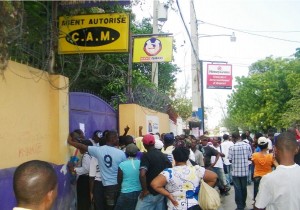 When I interact with fellow djaspora, I often pick up on what seems like a collective sense of frustration or despair with one another, and even with our beloved Haiti. Some of us have worked tirelessly for years to be more active in Haiti’s affairs and others of us have recently emerged within the last three years. Regardless, the angst that I observe seems, in part, due to the fact that the Diaspora in general has been unable to cohesively participate in moving the country forward.
When I interact with fellow djaspora, I often pick up on what seems like a collective sense of frustration or despair with one another, and even with our beloved Haiti. Some of us have worked tirelessly for years to be more active in Haiti’s affairs and others of us have recently emerged within the last three years. Regardless, the angst that I observe seems, in part, due to the fact that the Diaspora in general has been unable to cohesively participate in moving the country forward.
Remittance from the Diaspora remains the most sustainable financial resource available to Haiti — despite any political, societal or natural hardships the country grapples with. These dollars, however, are primarily transmitted through individual contributions to respective family members as opposed to extensive local or regional initiatives. At the same time, countless Haitians desire to scale up infrastructure upgrades and to foster stronger communities back home. As a result, many pursue individual projects, where possible, to work towards these goals.
The collective strength of Haitians living abroad could be more fully realized if there was a framework within which Haitians abroad could contribute towards large-scale redevelopment efforts.
To my knowledge, Haiti does not currently have an extensive tool that would allow it to understand the composition of its descendants outside of the country (or even within for that matter).
What if the country was better able to determine which Haitian communities produces the most emigrants, while also being able to quantify the emigres from these communities based on the cities they end up settling in?
In this way, Haiti would know that in Brooklyn, this number of Haitians come specifically from Cap Haitien and in Montreal, a certain percentage of all Haitians there come from Mirebalais, and so on. As localities work to propose and implement actual community projects, natives from these communities could then work towards supporting these developments in their hometowns.
Consider the city of Porto Alegre, Brazil, where for over twenty years, local citizens in this city of 1.5 million have engaged in participatory budgeting. This process allows the local community to get together and collectively determine what the city’s budget will be and how future spending and investment decisions will be made. Whereas 75 percent of households had access to water and sewer in 1988, this number grew to 98 percent in 1997 because of this community engagement process.
Furthermore, across the U.S., entities like Community Development Corporations (CDCs) work with local people to improve a community’s physical appearance as well as to spur economic activity that also enhances the social and economic well-being of the marginalized populations living in that community.
While the concept of community members taking part in planning and developing their own localities is not at all new, what is novel is for a Diaspora group to partner with its home community to bring about the physical and social change Haiti needs. Haitian localities do not have the funds that would allow for a participatory budgeting process to be useful nor do they tend to have the CDCs that would spur widespread local economic development. What Haiti does have though is a sizeable population of Haitians living abroad that it can partner with to leverage resources.
Establishing an entity at the local level, in partnership with municipal officials, would be an important step towards bridging the gap between the Diaspora and mainland Haitians. In this manner, Haitians abroad would have an actual medium through which they can collaborate with their kinship communities, and the communities would be better positioned to actively include those who are abroad.
Thus, if Leogane wanted to revitalize its commercial corridor, for example, it would begin by determining how much a new road would cost, the type of business activities that would thrive on this strip and the workforce development opportunities necessary among other issues. Upon gathering this information, local stakeholders would have clear objectives to present to its diasporic entity and members of the Diaspora from Leogane would know exactly what initiatives could most benefit from their assistance (financial or otherwise) with maximum impact for the entire community – including their families.
Overall, the utility of the Haitian Diaspora holds great promise for Haiti and creating a formalized structure for Diaspora engagement can significantly impact the progression of redevelopment efforts now and in the future. If members of the Diaspora from specific communities worked with their in-country counterparts to pursue key infrastructure or citywide initiatives for their localities, this would provide an opportunity for all Haitians to move away from individualized and short-term solutions towards lasting change.
As originally featured in the Haitian Times.


About The Author: Vanessa L.
More posts by Vanessa L.